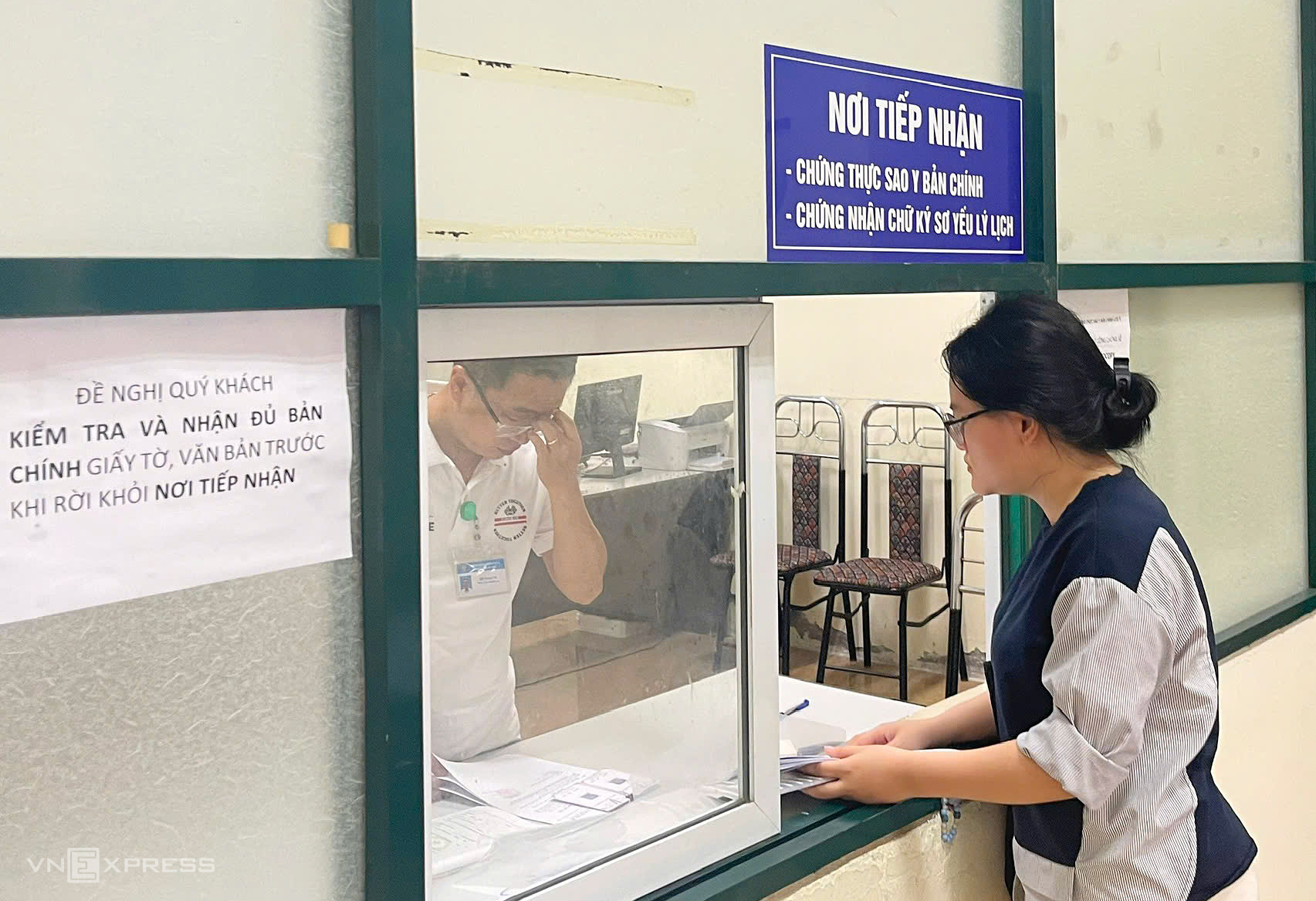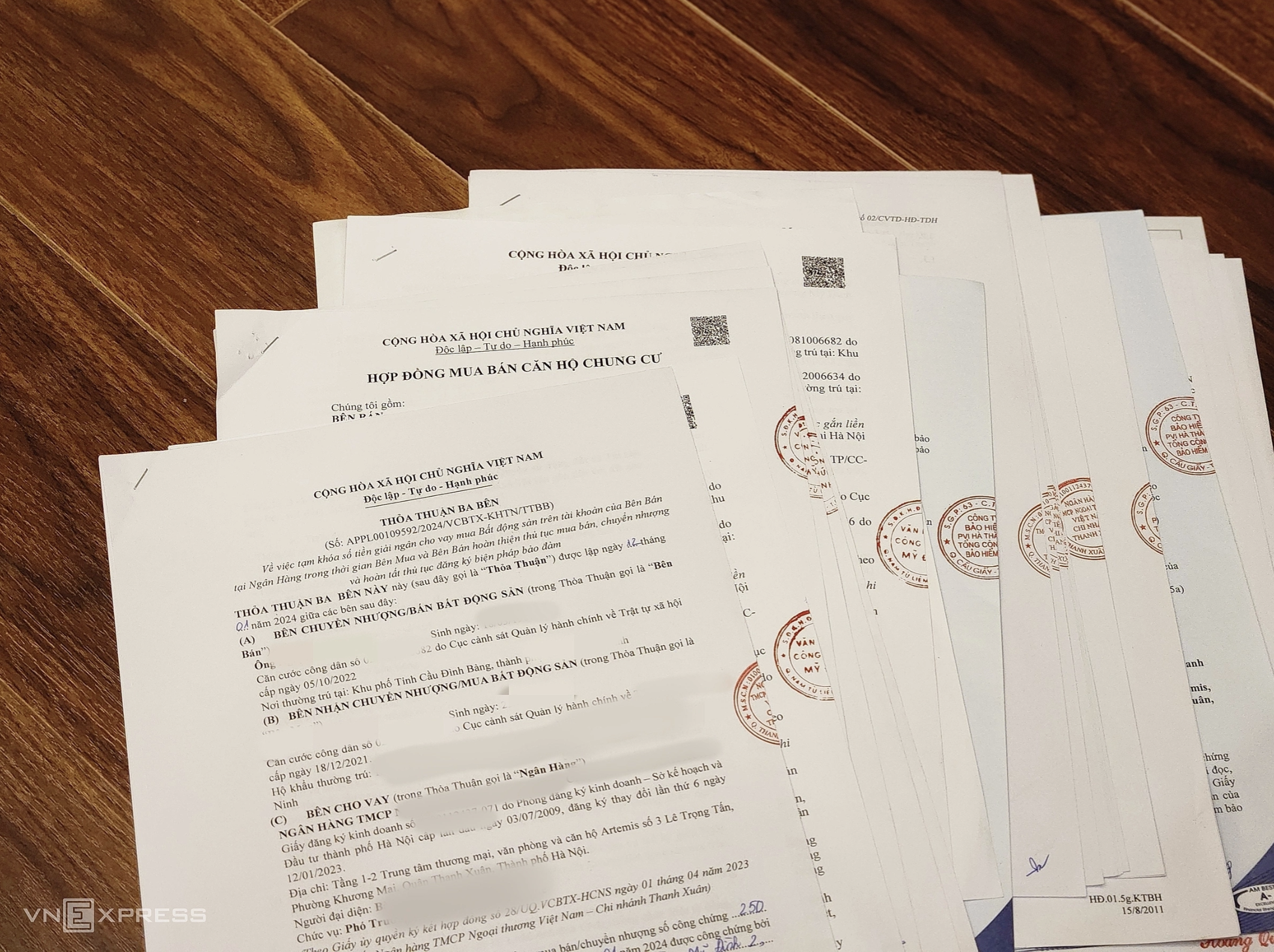This is one of the key changes introduced by the 2024 Law on Notarization, effective 1/7, following 10 years of the 2014 Law on Notarization.
Article 50 of the new law stipulates that individuals requesting notarization, witnesses, and interpreters must sign each page of the transaction in the presence of the notary public, except in certain specified cases.
"The signing of notarized documents, witnessed by the notary public, must be photographed and stored in the notarization records," the law states.
 |
Citizens undergoing notarization procedures at Notary Office No. 3, Cau Giay District, Hanoi. Photo: Pham Du |
Citizens undergoing notarization procedures at Notary Office No. 3, Cau Giay District, Hanoi. Photo: Pham Du
The process of photographing the "notary public witnessing the signing of notarized documents" must meet three requirements, according to Article 46 of Decree 104/2025, detailing the implementation of the Law on Notarization:
: a) The person signing the notarized document and the notary public performing the notarization must be clearly identifiable.
: b) The photograph must be clear, sharp, and fade-resistant. It must not be cropped, edited, or altered in any way.
: c) It must be printed in color or black and white on A4 paper. If special photo paper is used, the minimum size is 13 cm x 18 cm.
Individuals using thumbprints instead of signatures are also subject to these regulations.
Decree 104 also mandates photographs of witnesses and interpreters signing or thumbprinting documents in the presence of the notary public.
If deemed necessary by the requesting individual and the notary public, the process can be video recorded. Starting 1/7, these photographs and videos are recognized as part of the notarization record and are subject to legal regulations regarding storage and use.
Real estate notarization records must be kept for at least 30 years.
The new law also requires notarization organizations to retain real estate transaction records for at least 30 years and other transactions for at least 10 years, effective 1/7.
The 2014 law did not specify minimum retention periods for different types of transactions, only stating a general requirement of 20 years for original notarized documents and other related papers at the organization's headquarters.
Article 68 of the new law categorizes transactions by importance and specifies corresponding minimum retention periods. Real estate transactions require a 30-year minimum retention period, while other transactions require 10 years.
As photographs with the notary public are now part of the notarization record, they are also subject to these retention periods.
 |
Starting 1/7, notarization organizations must retain real estate transaction records for at least 30 years and other transactions for at least 10 years. Photo: Hai Thu |
Starting 1/7, notarization organizations must retain real estate transaction records for at least 30 years and other transactions for at least 10 years. Photo: Hai Thu
Four cases allow for off-site notarization.
Article 46 of the 2024 Law on Notarization states that notarizations must be performed at the organization's headquarters. However, off-site notarization is permissible in four cases:
: 1. Making a will at the testator's residence, as stipulated by the Civil Code.
: 2. Inability to travel due to health reasons, inpatient treatment, or quarantine.
: 3. Being detained, imprisoned, or subject to administrative measures.
: 4. Other justifiable reasons as defined by the Government.
Decree 104/2025 clarifies "other justifiable reasons" as:
: a) Pregnant women or those nursing children under 12 months old.
: b) Elderly or disabled individuals, or those with mobility issues.
: c) Individuals on duty in the People's Police or Army, or those whose absence from their post would affect their duties or responsibilities.
: d) Force majeure or objective obstacles preventing attendance at the notarization organization.
Off-site notarizations must occur at a specific address appropriate to the reason for the request.
Electronic and online notarization available from 1/7.
Depending on the needs of the parties involved, electronic notarization can be done in person or online. In-person electronic notarization still requires the presence of all parties before the notary public and applies to all civil transactions.
Online electronic notarization is for parties in different locations, concluding transactions online under the notary public's supervision. This applies to civil transactions, excluding wills and other unilateral legal acts, according to Decree 104/2025 guiding the implementation of the 2024 Law on Notarization.
Whether in person or online, the notary public and the notarization organization digitally sign the transaction, creating a legally valid electronic document equivalent to an original paper document.
Decree 104/2024 also mandates photographs with the notary public during the electronic signing process.
Paper notarization records must be digitized.
According to Decree 104/2025, for transactions from 1/7 onward, notarization organizations must convert paper records into digital data for electronic storage.
Records from before this date must also be converted and stored electronically by the organization currently managing them.
These converted digital records must be accurate and digitally signed by the organization before archiving. The retention periods outlined in Article 68 apply.
Even with digitized records, original paper documents must still be retained according to the rules (at least 30 years for land transactions and 10 years for others). Other non-original paper components of the record must be kept for at least 5 years, according to Decree 104/2025.
List of mandatory notarization transactions to be published online.
While the current law doesn't specify which transactions require notarization, the new law addresses this by defining criteria rather than listing specific transactions.
Transactions requiring notarization are "important transactions demanding high legal security, stipulated by law or by government regulations."
The Ministry of Justice is responsible for reviewing, updating, and publishing these transactions on its website. This will help individuals and businesses identify transactions requiring notarization and increase transparency in legal application.
Currently, contracts requiring notarization mainly involve property transfers, land use rights, etc.
Notary publics cannot be older than 70.
Notary public appointees must be Vietnamese citizens no older than 70 and are automatically dismissed upon reaching this age.
Notary publics over 70 on 1/7 can continue practicing for two more years before automatic dismissal.
The new law also simplifies contract notarization by removing the requirement for a request form, reducing the required documents to four.
The 2024 Law on Notarization, effective 1/7/2025, comprises eight chapters and 76 articles, two chapters and five articles fewer than the previous law.
Hai Thu












